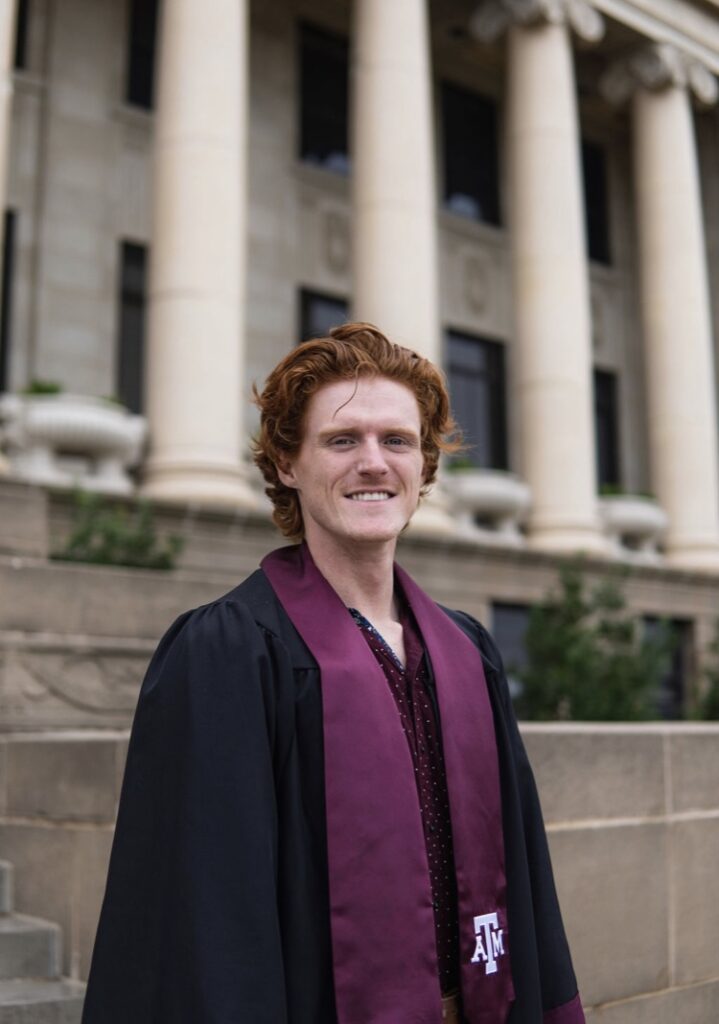First Department of Ecology and Conservation Biology graduate reflects on his experience
Campbell Webb ’22 shares his educational experiences, found passions and inspired beliefs about the interconnectedness of ecology.
The Department of Ecology and Conservation Biology at Texas A&M College of Agriculture and Life Sciences was established in January 2020 through a restructuring of the former Department of Ecosystem Science and Management and Department of Wildlife and Fisheries Sciences, WFSC.

“The department has made incredible strides during its first three years,” said Kirk Winemiller, Ph.D., interim department head. “Our faculty and students conduct research across all ecological levels and strive to conserve biodiversity and natural resources in our rapidly changing world. I am proud of the ways we are advancing science and positively impacting the world.”
Serving as an example of the passionate students studying within the department, Campbell Webb walked the stage on Dec. 16 as the first graduate of the Department of Ecology and Conservation Biology, ECCB. He reflected upon his experiences earning a bachelor’s degree in ecology and conservation biology.
What drew you to Texas A&M and your major?
Growing up I was always an outdoorsy kid and loved the outdoors. There was a creek right next to my childhood home, and I was in that thing for eight hours a day and smelling as bad as one possibly could. Also, I did Boy Scouts growing up, and when I was about 16, about when I started driving, I visited nearly every fishing hole in College Station.
I never fully grasped the fact that there’s a whole world outside of Brazos County. All I knew about the outdoors was “that’s where I do my fishing,” so wildlife and fisheries science at Texas A&M sounded very cool.
However, once I got into the coursework, I understood its practicality. Wildlife and fisheries is a field that addresses some of our greatest environmental challenges, and now I’ve got the tools to go along with my passion that will allow me to help.
Was there a difference when the department transitioned to the Department of Ecology and Conservation Biology?
My focus in WFSC started off as “I like fishing.” However, once I moved into ECCB, my coursework shifted to focus on a more holistic approach to ecology.
The subject went from simply being outdoors to this hyper-complex network of interactions that occur every day for species to survive and thrive. The realization that this was something that I could be a part of was just super cool. I’ve developed quite a passion for protecting the environment and managing our resources.
Describe your time in ECCB. Any unique classes? Favorite mentors or professors?
During my last semester, I took fish eco-physiology, which sounds quite daunting, and it was. However, I enjoyed the challenge. Fish eco-physiology is literally everything about a fish. Day one, we’re breaking down chemoreceptors and olfactory systems and jumping straight into it. You don’t think about it, but this fish that you see, just swimming in a creek, is doing a million things at one time in order to stay alive.
My time in ECCB was influenced a lot by Dr. Perry Barboza, who was my WFSC 101 professor. I ended up taking a couple more classes with him, and I really loved his teaching style. I learned a lot from him, and I really like the way we interacted. He was the original driver of my WFSC career, which expanded into this bigger scientific realm with ECCB.
What is next for you?
My fiancé is in law school at Louisiana State University, so I’ll be moving there. Right now, all I want to do is be an ecologist. I want to be in the field, I want to take measurements, I want to interpret those measurements, and I want to produce and use real data.
I want to be somewhere I’m making a difference. I want to be doing something productive, and I want to be able to help people help the environment.
Why should someone major in ECCB?
When you spend the majority of your time in school studying ecological interactions, it can seem almost intuitive after a while. But whenever I’ve told friends about ecology, it was incredible to see how much they were unaware of these incredibly important interactions.
I wrote a paper about wolf re-population in Yellowstone National Park. In general, people have no idea what happened to the wildlife in the park. For example, coyotes nearly took over and almost completely wiped out the pronghorn population. Some of my friends read my paper, and they did not have any clue that those things were happening. They were huge deals. I realized that I had learned how to present knowledge that I’d gained to the general public.
We are faced with many environmental and natural resource challenges, such as poor management of water and loss of species that result in a void within the food chain. This food chain disruption can result in further species losses as well as disruption of ecosystem processes.
I enjoy describing those chains of events and getting people to understand that there’s more to what is happening around you than you think. Developing this passion has been really cool, and I think the ECCB coursework has done a lot to bring that out of me.
I’m incredibly grateful for the professors and teaching assistants who taught me. I had a lot of fun studying ecology alongside them. I was always surrounded by good people who really cared about what they were doing. For me, that’s my biggest takeaway. It was an enjoyable experience the entire way through, and I love what I did and learned.


